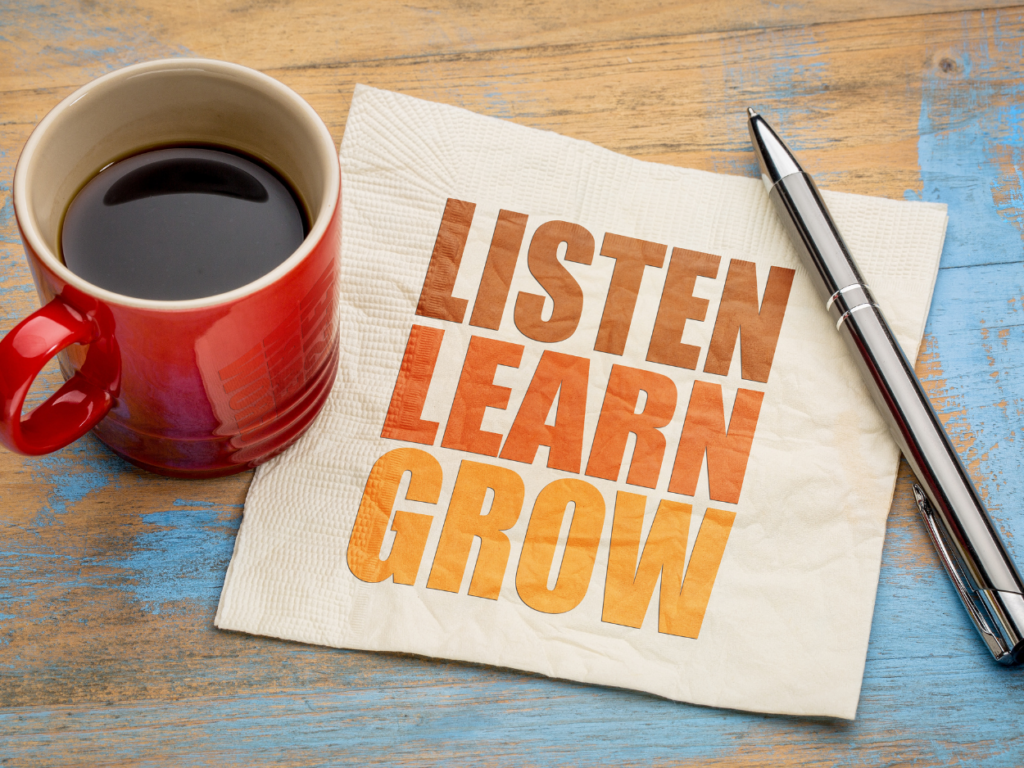Listening is one of the most overlooked, yet crucial skills in life. It’s often overshadowed by the more flashy and attention-grabbing skills like speaking or writing, but the truth is, listening is the foundation for many of our most important relationships and experiences.
So, how do you become a better listener?
It starts with making a conscious effort to focus on what others are saying and to truly hear their words. This means putting aside our own thoughts and opinions and being open to what others have to say. It also means being present in the moment and avoiding distractions like checking our phones or thinking about our own problems.
Another important aspect of listening is being non-judgmental. When we listen, it’s important to leave our opinions and biases at the door and truly listen to what others have to say without judgment. This creates a safe space for open and honest communication.
Finally, it’s important to follow up and respond to what others have said. This shows that we were truly listening and that we value what they have to say. It can be as simple as asking a follow-up question or offering a word of encouragement, but it makes a big difference in building strong relationships.
So, why is listening just so important?

Communication
Listening is the cornerstone of effective communication. It allows us to truly understand what others are saying and respond in a meaningful way. When we listen, we show that we value the thoughts and feelings of others and create a deeper connection with them.
Empathy
Listening is the key to empathy, the ability to understand and share the feelings of others. When we listen, we learn about other people’s experiences, perspectives, and struggles. This helps us to see the world from their point of view and to be more compassionate and understanding towards them.
Problem solving
Listening is an essential tool for problem solving. By truly hearing what others are saying, we can identify the root of the problem and work together to find a solution that works for everyone.
Personal growth
Listening to others can also be a source of personal growth. We can learn from the experiences and perspectives of others and use that knowledge to improve our own lives. Whether it’s a mentor sharing their wisdom or a friend talking about their challenges, we have the opportunity to learn and grow every time we listen.
Relationships
Listening is the foundation for strong relationships. When we listen, we show that we care about what others have to say and that we’re interested in their lives. This creates a deeper connection and trust between people, making our relationships stronger and more meaningful.
The importance of listening can’t be overstated. It’s a skill that can transform our relationships, our problem-solving abilities, and our personal growth. And the best part? It’s a skill that can be learnt and practiced by anyone.
Listening as a language skill

Language learning generally focuses a lot on speaking, and rightly so. But speaking is only one part of the jigsaw puzzle that is learning a new language. Without the appropriate listening skills, speaking becomes impossible. If you don´t understand a question or what someone has said to you, how the hell are you going to reply!
Listening seems like it should be simple, or secondary to other more active language skills. To the surprise of many new learners, listening to a foreign language is really quite difficult.
But, listening is a vital skill for language learning.
Research shows that when we communicate, we spend around 40-50% of our time listening, 25-30% speaking, 11-16% reading and only 9% writing (although that last one might have changed in recent years due to the rise in social media).
That means we spend about half the time listening!
Listening is an essential aspect of learning a foreign language because it allows you to hear and understand the sounds, words, and phrases used by native speakers in real-life situations.
Here are 4 reasons why listening is so crucial when learning a foreign language
Helps you improve your pronunciation
Listening to native speakers can help you pick up the correct pronunciation of words and phrases. This can help you speak more fluently and be understood more easily.
Improves your comprehension skills
Listening to spoken language can help you understand the meaning of words and phrases in context. This is important for developing your comprehension skills, which are essential for speaking and reading in a foreign language.
Enhances your vocabulary
Listening to native speakers can help you learn new words and phrases that you might not have encountered in a textbook. This can expand your vocabulary and make it easier for you to express yourself in the language.
Improves your communication skills
Listening to native speakers can help you understand how to use the language in real-life situations, including conversations, presentations, and interviews. This can help you communicate more effectively and confidently in the language.
4 Ways to improve your foreign language listening skills
There are many keys to improving our listening in a second language. Learning to listen effectively is vital.
It´s likely that we’ve not been specifically taught how to listen in a foreign language, or if we have we’ve not been taught properly.
Let’s delve into the research to find out why listening is important and how we can improve our foreign language listening skills.
1 Listening Is an active process
If you’ve ever sat in a group of people speaking in a foreign language, you’ll be familiar with the uncomfortable feeling that you should be joining in. You feel like, if you’re not saying something, you’re not really engaging in the conversation.
Nothing could be further from the truth. The problem is that you’re confusing a silent process with a passive process.
Listening is a very active process, despite the fact you’re not saying anything. That’s why you’re so tired when you go home after a social event in another language.
Getting over the feeling that we are “doing nothing” is a key step towards listening effectively.
Try using active listening techniques, to remind yourself and others that you’re involved in the conversation even if you don’t speak so much.
Here are some tips to show that you are actively listening:
- Make eye contact with the person who’s talking.
- Lean forward slightly to show interest. If you’re actually listening this should be natural.
- Nod your head slightly to show you’re understanding.
- Agree and nod your head if you agree with something that has been said. You can use expressions like, “sure”, “of course” or “uh-huh”.
- Don’t look distracted by fidgeting, playing with your phone or looking off into the distance.
2 Your brain is a foreign language goldfish
Would it surprise you to learn that your short-term memory is even shorter in a foreign language?
When you think about it, it makes sense.
Listening is a vital step in overcoming this problem.
But, why does it happen?
This effect might be due to how our short-term memory works. When we listen to someone talking, our brain starts processing the information by “segmenting” it into small chunks to store in our short-term memory. It splits them up based on our knowledge of the “rules” for how the language is spoken. Instead of storing the actual words, for example, “a green goldfish,” our brain would maybe convert those words into an image of a green goldfish for storage.
In a foreign language, we aren’t familiar with the “segmentation rules” for how the language is spoken. Our short-term memory has to store all the words individually.
One reason why listening is so important in a foreign language is that it helps us become familiar with those segmentation rules.
Not only will it boost your understanding, it will improve your speaking in the language too.
Learning segmentation rules is usually an unconscious process, so the easiest way to learn them is to get lots of listening practice.
Here are some ways to become more familiar with a language’s segmentation rules:
- Watch films in your target language.
- Read a book while also listening along to the audio book version.
- Attend social events or come to Complete English Club and spend time with natives.
- Be exposed to different accents in your target language. Here at Complete English we have 6 different nationalities and 8 completely different accents.
- Listen to the radio or podcasts in your target language.
- Watch videos online in your target language.
If you enjoy listening to authentic media in your target language, there are ways you can build your language learning around that.
3 Our listening strategies are upside-down
If you studied a language at school, what listening strategy were you taught?
I can still remember that a listening exam when I was at school, went like this :
We were taken into the Language Lab. This was a classroom where each student had their own futuristic tape recorder along with a headset (yes, it was all tapes in those days). Something comparable these days with a DJ´s turntable. We would then be told to listen to a tape and then translate what we’d heard. The specifics were important, the difference between a pass and a fail. You would lose marks if you messed up the gender of a word, for example.
Language researchers call this a bottom-up listening strategy.
Bottom-up listening is an okay strategy to use in the classroom. It means carefully listening to each word, pronoun and sentence structure to work out what has been said. Unfortunately, it’s not a complete listening strategy for use in the real world.
In the real world, you can’t spend all your listening energy focusing on specific grammar while people speak. They’ll keep talking and you’ll be lost.
Top-down listening, on the other hand, is a great strategy to add more understanding of what’s being said.
Top-down listening strategies focus on concepts. This basically means that you learn a little about the spoken topic beforehand. Here are a few suggestions for implementing a top-down listening strategy for some common activities:
- If you’re going to see a movie or play in a foreign language, read the story first.
- Read up on the topic before going to see a presentation.
- Try reading about or predicting the content of an audio passage before you listen to it. This will get your brain focusing on concepts and not just specific words.
4 The gist is only half the story (or less)
Finally, one thing that we often neglect when listening in another language is to check exactly how much we have understood.
Beyond a certain level of language ability, we often “get the gist” (the general meaning) of what was said. However, sometimes we haven’t understood as much as we think.
Next time you listen to something in your target language, try these four short, easy exercises to prove to yourself that you’ve understood what was said:
- Try drawing a picture of what was said. This could be in the from of a drawing of a specific vocabulary word that you think you understood.
- Ask yourself some questions about it and try to answer them.
- Provide a summary of what was said.
- Suggest what might come next in the “story.”
Commit to Listening
As you can see, listening is pretty important. Are you ready to commit to listening better in your target language?
Just remember to use active listening techniques.
When you follow the exercises to check how much you’ve understood, you’ll be amazed at the change!
Something I get asked a lot by students is the following :
What´s the key to improving my English?
My answer, not surprisingly, is always the same – Listen, listen and listen some more. The more you listen, the better your English will be.
First of all you have to decide on the purpose of your listening : If your main practice comes from watching TV shows or films then you have to decide whether you want to watch for entertainment or to work on your listening skills. If entertainment is your goal, then watching your favourite show in your own language or with subtitles is fine but if your objective is to improve your listening in another language then NO SUBTITLES!
Subtitles make your eyes focus on reading them and so, taking your attention away from listening. No subtitles means that you really have to focus on listening.
In conclusion, listening is the most important thing in life because it’s the foundation for effective communication, empathy, problem solving, personal growth, and strong relationships. So, the next time you’re in a conversation, take a moment to listen deeply and see the difference it can make.
GLOSSARY
overlooked (adj) – to fail to notice
crucial (adj) – very important
overshadowed (adj) – to appear more important than
flashy (adj) – fashionable and noticeable in a vulgar way
to grab – grabbing – to take quickly or violently
conscious (adj) – to be aware of mentally, to be awake physically
aside (adv) – to one side
judgemental (adj) – to display overly critical points of view
biases (n) – unfair inclination for or against a person or group
encouragement (adj) – giving someone support, confidence and hope
cornerstone (n) – an important quality or feature on which a particular thing depends
meaningful (adj) – with meaning
struggles (n) – a violent effort to get free of restraint
compassionate (adj) – feeling sympathy and concern for others
root (n) – the basic cause, source or origin of something
mentor (n) – person who gives life lessons
wisdom (n) – knowledge and experience
to trust (v) – to firmly believe in the truth or ability of someone
overstated (adj) – state too strongly or exaggerate
jigsaw puzzle (n) – puzzle consisting of small irregularly cut pieces that are to be fitted together to form a picture
vital (adj) – essential
to pick up (phrasal v.) – to collect
encountered (adj.) – found
to delve into (phrasal v.) – to examine something carefully in order to discover more information about someone or something
to find out (phrasal v.) – to discover
to nod (v) – move your head up and down in agreement
to fidget – fidgeting (adj) – to make small nervous movements, normally with your hands or feet
chunks (n) – small manageable pieces
to split (v) – to divide into two similar pieces
beforehand (adv) – in advance
to neglect (v) – fail to care for properly

